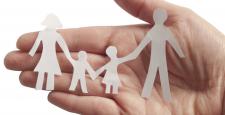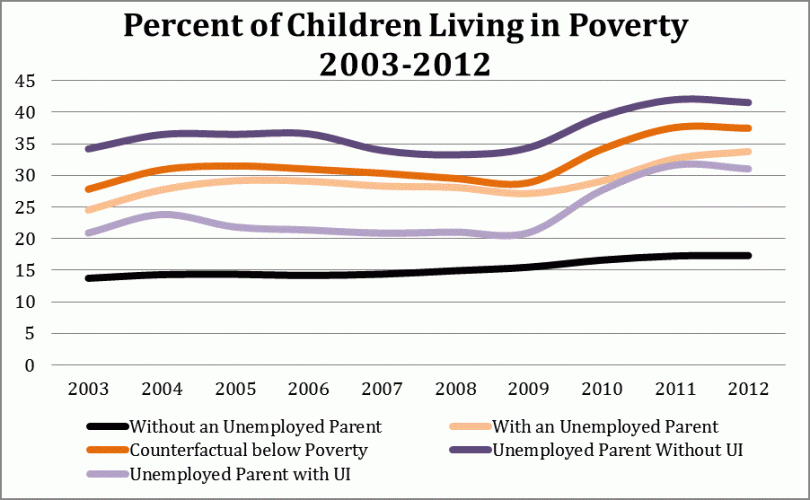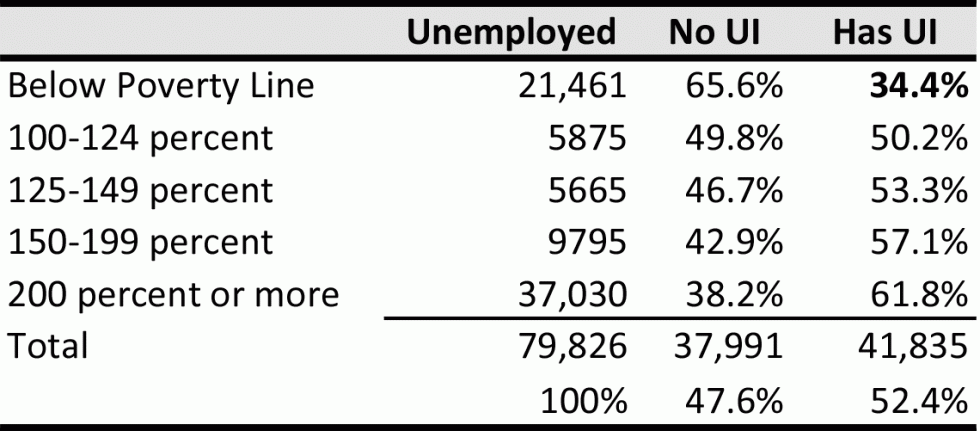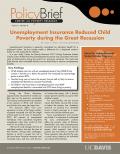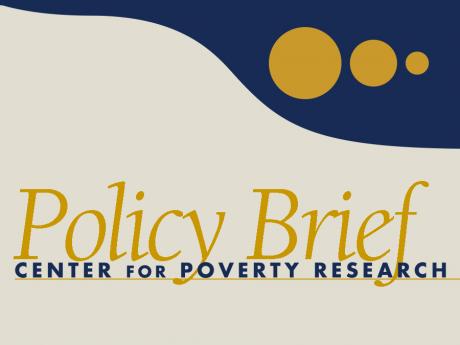Unemployment Insurance Reduced Child Poverty During the Great Recession
by Caren A. Arbeit, 2012 Visiting Graduate Scholar
Unemployment Insurance is generally considered an individual benefit for a displaced worker. Yet that income makes a difference for a displaced worker’s family as well, especially for children.
In a new study, Center for Poverty Research 2012 Visiting Graduate Student Scholar Caren Arbeit finds that Unemployment Insurance was associated with lower rates of child poverty during the recent U.S. economic recession. The study also finds that the most vulnerable families are the least likely to receive unemployment benefits.
Key Findings
- Of all children who live with an unemployed parent, from 2008-12 the number in families at or below the poverty line increased by 6 percentage points to almost 35%.
- Families living near or below the poverty line are half as likely to receive unemployment benefits as non-poor households.
- Since 2009, the receipt of unemployment benefits is associated with 25% fewer children with an unemployed parent living in poverty.
During the Great Recession, approximately 16 percent of workers lost their jobs as the economy contracted. The national unemployment rate peaked at ten percent in 2010, and recovery over the last two years has been slow.
This recession differs from prior recessions in terms of the large numbers of people impacted, but also the length of time spent out of work. In December 2012, 40 percent of unemployed individuals were considered long-term unemployed when they could not find work for six months or more.
The loss of a job changes the lives of individual workers, but also the lives of their families. Among other challenges, families in which a parent has lost a job have fewer financial resources and increased stress. Job loss, and the loss of income that comes with it, directly impact parents’ abilities to pay for their children’s needs.
For some families, the lost income means that family income falls to near or below the poverty line. Academic research on poverty has identified losses in family earnings as a major reason why families become poor.
Since unemployment and poverty are linked, it is important to understand the way unemployment policies affect the poverty status of families. Specifically, how does Unemployment Insurance (UI) for out-of-work parents impact child poverty? And which parents are most likely to receive UI? These questions help identify the ways a social policy aimed at an individual can impact entire families.
The Data on Child Poverty
To understand how UI impacts child poverty, this study uses data
from the 2003-12 March Supplements of the Current Population
Survey (IPUMS-CPS) distributed by the Minnesota Population
Center. The data are nationally representative and from a single
point in time from year to year, which means that respondents
from 2005 and 2008, for example, are different individuals. The
study includes only those who were potentially eligible to
receive UI benefits (because they were in the labor force and
looking for work).
Unemployment Insurance and Child Poverty
Figure 1 shows the percentage of children who live in poverty
depending on whether a parent is unemployed, and whether or not
that unemployed parent receives UI income. The orange line
represents a “counterfactual” poverty rate, showing what the
poverty rate would have been if not for the income provided by
UI, assuming no changes in job-search behavior.
From 2003-12, at least a quarter of children with an unemployed parent lived in poverty. From 2008-12, the number living with an unemployed parent and incomes at or below the poverty line increased by nine percentage points to almost 35 percent. Even since the recession ended, children with an unemployed parent are still more likely to live in a poor household than prior to the recession.
It is important to note that only half of children with an unemployed parent receive UI. A parent who did not meet state requirements for UI benefits, or did not claim benefits, would not receive UI. Congress and some states extended UI benefits during the recession, but some unemployed workers still exhausted their benefits. Others no longer qualified for benefits because they stopped looking for work.
This study finds that poverty status is related to the probability of receiving UI benefits. From 2003-12, approximately 64 percent of families living below the poverty line who had an unemployed parent received no UI benefits.
Since 2010, over 40 percent of children in households with an unemployed parent who does not receive UI have lived in poverty. This is five percentage points higher than in 2003, prior to the recession. This poverty rate is over 10 percentage points higher than for children living in households where an unemployed parent receives UI.
Policy Implications
Unemployment Insurance and other forms of unemployment-related
income make a small, yet important difference in preventing child
poverty. This study suggests that during the recession, the
income from unemployment insurance benefitted children by
lowering the likelihood a family’s income would slip below the
poverty line, or even within 125 percent of it.
Yet, Unemployment Insurance provides an uneven benefit. Children with unemployed parents living near or below the poverty line are nearly half as likely to live in a home receiving unemployment benefits than children who live in non-poor homes.
It is important to acknowledge Unemployment Insurance’s unintended beneficiaries beyond the individual displaced worker. In discussions of unemployment in the post-recession economy we must acknowledge the potential consequences to children of discontinuing or limiting unemployment benefits.
Meet the Researcher
Caren Arbeit is a Ph.D. candidate in Sociology at the University
of Minnesota, and a Graduate Research Assistant at the Minnesota
Population Center. Her dissertation research examines the
long-term educational consequences of parental unemployment, with
a focus on children in poor and near-poor families.


